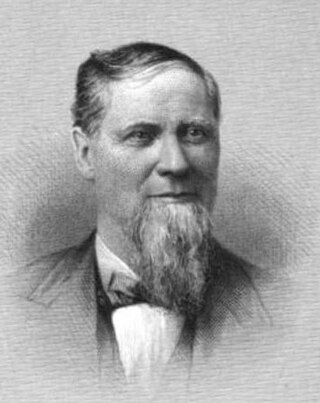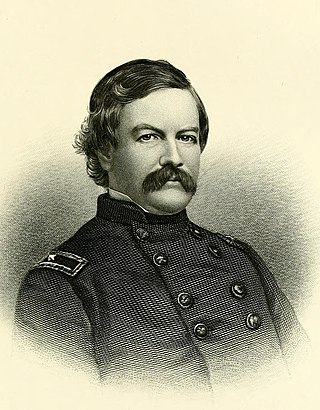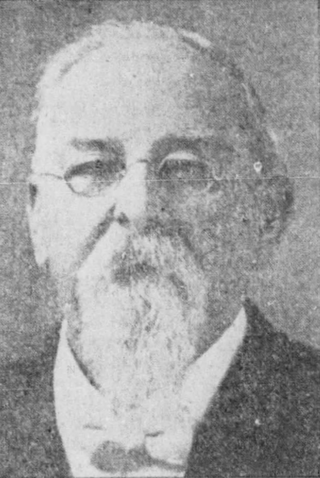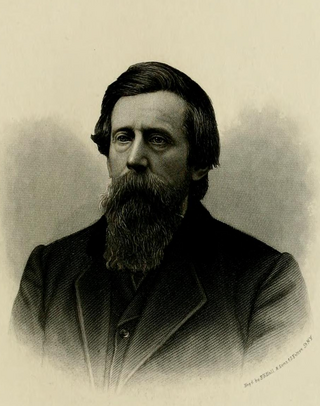Related Research Articles

Gardner Robert Withrow was an American union representative and Progressive Republican politician from La Crosse, Wisconsin. He served ten terms in the U.S. House of Representatives, representing western Wisconsin from 1931 to 1939, then again from 1949 to 1961. During his first term, he represented Wisconsin's 7th congressional district, for the other nine terms he represented Wisconsin's 3rd congressional district. Before being elected to congress, he served one term in the Wisconsin State Assembly (1927). He was a fourth cousin of Abraham Lincoln.

Ormsby Brunson Thomas was an American lawyer, Republican politician, and Wisconsin pioneer. He was a member of the United States House of Representatives for three terms (1885–1891), representing Wisconsin's 7th congressional district. He also served five years in the Wisconsin Legislature and 13 years as district attorney of Crawford County, Wisconsin.

Joseph Rankin was an American businessman and Democratic politician. He was elected to two terms as U.S. Representative for Wisconsin's 5th congressional district, but died during his second term. Earlier in his career, he served 11 years in the Wisconsin Legislature, representing Manitowoc County, and was chairman of the Democratic Party of Wisconsin.

Gilbert Motier Woodward was an American lawyer and politician. He served one term in the United States House of Representatives, representing Wisconsin's 7th congressional district. He was also the 16th mayor of La Crosse, Wisconsin, and the Democratic nominee for Governor of Wisconsin in 1886. During the American Civil War he served as a Union Army officer in the famed Iron Brigade of the Army of the Potomac.

Harrison Carroll Hobart was an American lawyer, Democratic politician, and Union Army officer during the American Civil War. He was the 2nd speaker of the Wisconsin State Assembly, and served in the 1st Wisconsin Legislature as a member of the Wisconsin Senate. He was the Democratic nominee for Governor of Wisconsin in 1859 and 1865.
John Milton Duane Bartlett Jr. was an American lawyer, Republican politician, and Wisconsin pioneer. He was a member of the Wisconsin Senate, representing much of northwestern Wisconsin during the 1862 and 1863 sessions. His name was often abbreviated as M. D. Bartlett.
William H. Hull was an American lawyer, Democratic politician, and Wisconsin pioneer. He was the 9th speaker of the Wisconsin State Assembly (1856) and represented Grant County.

Henry Conner was an American hotelier, restaurateur, and politician. He was a member of the Wisconsin State Senate, representing Vernon and La Crosse counties during the 1891 and 1893 sessions. Earlier, he served as a Union Army officer during the American Civil War, and lost his right leg due to wounds. His last name was sometimes spelled Connor.

George Edwin Bryant was an American lawyer, judge, and Republican politician. He served as a Union Army officer during the American Civil War and afterwards served as a brigadier general in the Wisconsin National Guard. He also served four years in the Wisconsin Legislature, representing Dane County, and was appointed Wisconsin Superintendent of Public Property by Governor Robert M. La Follette, serving from 1901 until his death in 1907.
Edwin Flint was an American lawyer, Republican politician, and Wisconsin pioneer. He was one of the first settlers at La Crosse, Wisconsin, and represented the area in the Wisconsin State Senate for one year. He also served as Wisconsin circuit court judge for the western part of Wisconsin from 1863 through 1868.
Cyrus Marion Butt Sr. was an American farmer, lawyer, politician, and Wisconsin pioneer. He was a member of the Wisconsin Senate during the 1869 and 1870 sessions, representing La Crosse and Vernon counties. He also served six years as district attorney and 12 years as county judge in Vernon County, and served as a Union Army officer through much of the American Civil War. In historical documents, his name is often abbreviated as C. M. Butt.

The Ninth Wisconsin Legislature convened from January 9, 1856, to March 31, 1856, in regular session, and re-convened from September 3, 1856, to October 14, 1856.
John Glen Fitzgerald was an American businessman, Democratic politician, and Wisconsin pioneer. He was the 7th mayor of Oshkosh (1861), and represented Winnebago County for one year in the Wisconsin Senate (1856).
Samuel Gonsalus Bugh was an American physician, newspaper publisher, politician, and Wisconsin pioneer. He served two years in the Wisconsin State Senate, representing Lafayette County, and published the Pick and Gad newspaper in Shullsburg, Wisconsin.

Samuel L. Rose was an American lawyer, judge, and politician. He was a pioneer settler of Beaver Dam, Wisconsin, and represented that part of the state in the Wisconsin State Senate and State Assembly (1855). He later served as an Iowa circuit court judge and is the namesake of Rose Grove Township, Hamilton County, Iowa.
George Edward Dexter was an American lawyer, banker, politician, and pioneer of Wisconsin and Minnesota. He was a member of the Wisconsin Senate, representing Green County during the 1856 and 1857 sessions. He was one of dozens of lawmakers in the 1856 session caught up in the La Crosse and Milwaukee Railroad bribery scheme.
Edward Gernon was an American lawyer, politician, and Wisconsin pioneer. He was a member of the Wisconsin Senate, representing Waukesha County during the 1856 and 1857 sessions. He was one of dozens of lawmakers in the 1856 session caught up in the La Crosse and Milwaukee Railroad bribery scheme.
Moses Mitchell Davis was an American physician, Republican politician, and Wisconsin pioneer. He was a member of the Wisconsin Senate, representing Columbia County from 1857 through 1861, and served one term in the Wisconsin State Assembly, in 1856. He was also a regent of the University of Wisconsin, where he was instrumental in passage of a resolution in favor of co-education.
William Henry Tucker was an American lawyer, Democratic politician, and Wisconsin pioneer. He was a member of the Wisconsin Senate, representing a large district of then-sparsely populated western Wisconsin during the 1858 and 1859 sessions.
John Alonzo Chandler Sr. was an American railroad agent, Republican politician, and pioneer of Wisconsin and Minnesota. He was a member of the Wisconsin Senate, representing La Crosse and Monroe counties during the 1865 and 1866 sessions. He is the namesake of Chandler, Minnesota.
References
- 1 2 "Died at his Post". Semi-Weekly Wisconsin. September 18, 1863. p. 1. Retrieved February 17, 2023– via Newspapers.com.
- ↑ "The Democratic Caucus". The Weekly Wisconsin. September 15, 1852. p. 2. Retrieved February 17, 2023– via Newspapers.com.
- ↑ "Legislative Nominations". Wisconsin State Journal . October 6, 1853. p. 3. Retrieved February 17, 2023– via Newspapers.com.
- 1 2 "Annals of the Legislature". The Blue Book of the State of Wisconsin 1882 (Report). State of Wisconsin. 1882. pp. 187, 189, 191 . Retrieved February 17, 2023.
- 1 2 Butterfield, Consul Willshire (1881). History of La Crosse County, Wisconsin. Western Historical Co. pp. 525–526 . Retrieved February 17, 2023.
- ↑ "La Crosse Items". Wisconsin State Journal . May 30, 1857. p. 2. Retrieved February 17, 2023– via Newspapers.com.
- ↑ "The Corruptionists–––Who are They!". Wisconsin State Journal . October 30, 1858. p. 2. Retrieved February 17, 2023– via Newspapers.com.
- ↑ Quiner, Edwin B. (1866). "Regimental History–Thirty-First Infantry". The Military History of Wisconsin. Clarke & Co. pp. 793–799. Retrieved February 16, 2023.
- ↑ "Thirty-First Regiment Infantry". Roster of Wisconsin Volunteers, War of the Rebellion, 1861–1865 (Report). Vol. 2. Office of the Adjutant General of Wisconsin. 1886. p. 444 . Retrieved February 17, 2023.